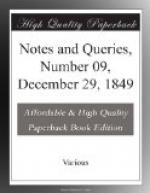Would it not be worth while that some inquiry should be made about the fate of this picture?
R.O.
Dec. 17. 1849.
P.S.—I may add, that there was affixed to the bottom of the frame of the picture a board, on which was painted, in conformably large letters—
“LORD, remember David and all his trouble.”
Psalm cxxxii. 1.
The italics in part of the Note above quoted are mine.
Autograph Mottoes of Richard Duke of Gloucester, and Henry Duke of Buckingham.—In the volume of the Cottonian MSS. marked Vespasian F. XIII., at fol. 53., is a slip of parchment, upon which is written by the hands of Richard Duke of Gloucester, and Henry Duke of Buckingham, the following couplet:—
“Loyaulte me lie
Richard Gloucestre
“Souente me souene
Harre Bokingh’a’m.”
A fac-simile is engraved in Autographs of Royal, Noble, Learned, and Remarkable Personages in English History, engraved by C.J. Smith, and edited by Mr. John Gough Nichols, 1829, 4to., where the editor suggests that this slip of parchment was “perhaps a deceitful toy,” or it may have been attached to some present offered by the Duke of Gloucester to his royal nephew Edward the Fifth. The meaning of Gloucester’s motto is perfectly free from misapprehension; but he asserts his fidelity to the crown, which he soon so flagrantly outraged—“Loyalty binds me.” In the work above mentioned, the motto of Buckingham is interpreted by these words, in modern French:—“Souvent me souviens.” This does not appear to me perfectly satisfactory; and I have to request the opinions of such as are conversant with old manuscripts, whether the true meaning, or even the true reading, of the Duke of Buckingham’s motto has as yet been ascertained?
H.
* * * * *
NOTES IN ANSWER TO QUERIES.
Lord Erskine’s Brooms.—“G.B.” informs us, that the anecdote about Lord Erskine’s brooms, and the apprehension of his servant for selling them without a licence, will be found in his Life by Lord Campbell (Lives of the Chancellors, vol. vi. p. 618.). Erskine himself attended the sessions to plead the man’s cause, and contended that the brooms were agricultural produce, or, as he jocosely observed, “came under the sweeping clause.” The when is about 1807, and the where an estate in Sussex, which proved rather an unprofitable speculation to its owner, as it produced nothing but birch trees, and those but stunted ones. To which information “W.J.” adds, that about the same period Lord Erskine printed, for private circulation, An Appeal in favour of the agricultural Services of Rooks; a production probably scarce now, but full of humanity, and very characteristic.
Scarborough Warning.—In a postscript to a letter written from court on the 19th January, 1603, by Toby Matthew, Bishop of Durham, to Hutton, Archbishop of York, I find the term Scarborough warning. Can any of the correspondents of your valuable paper inform me of the origin and prevalence of this saying? The postscript is—




